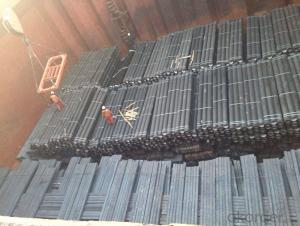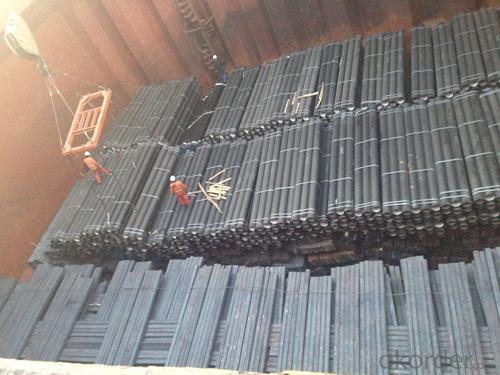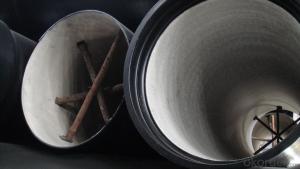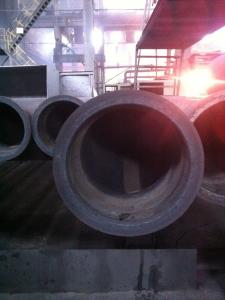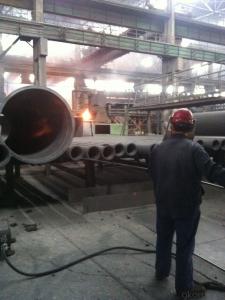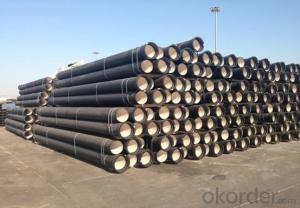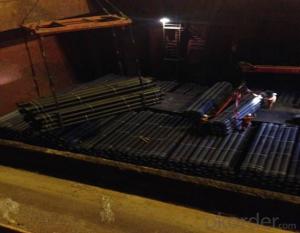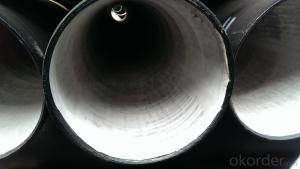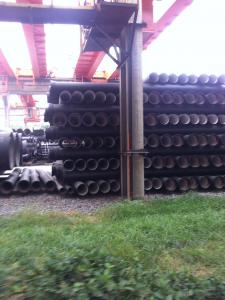DUCTILE IRON PIPES AND PIPE FITTINGS K9 CLASS DN1800
- Loading Port:
- Tianjin
- Payment Terms:
- TT OR LC
- Min Order Qty:
- 22 pc
- Supply Capability:
- 3000 pc/month
OKorder Service Pledge
OKorder Financial Service
You Might Also Like
Material : Ductile Cast Iron
Size Range : DN 80mm to DN 2000mm
Unit Effective Length : 6m or 5.7m
Manufacture Standard: ISO 2531:1998/ EN 545:2006/EN 598:2007
Annual capacity : 200,000 tons
Coating Exterior: Zinc 130g/m2 according to ISO 8179-1 and bitumen coating 70 microns.
Cement Interior: Portland Cement/ High Alumina Cement/ Sulphate Resisting Cement Lining according to ISO 4179
Special requirements on external coating and internal lining can be applied
We also provide accessories such as SBR/EPDM rubber gaskets, lubricant paste, pipe caps, PE sleeves, etc.
Additional Parts:
Each pipe is strictly inspected according to related standard to ensure permanently high performance.
Easy Installation at site and service free for life
Long Service Lifespan
Quotation will arrive you within 24hours once we get your inquiry.
We guarantee offering you a competitive price.
A copy of original inspection reports of pipes will be offered after shipment.
Photos of loading process will be sent to the customer after shipment effect.
We will follow-up the delivery progress after shipment effect and update to the customer on weekly basis.
- Q: Can ductile iron pipes be used for underground fuel storage systems?
- Underground fuel storage systems can utilize ductile iron pipes, which offer superior strength, durability, and flexibility compared to traditional cast iron pipes. These properties render ductile iron pipes suitable for a range of applications, including underground fuel storage. An important advantage of ductile iron pipes is their resistance to corrosion, a crucial factor for underground storage systems that may encounter various fuels and chemicals. Furthermore, their high tensile strength and resilience enable them to withstand external pressure and loading, ensuring the integrity and safety of the underground storage system. Additionally, ductile iron pipes boast a long lifespan, typically lasting for several decades. This longevity makes them a cost-effective option for underground fuel storage systems, as they can bear the weight of stored fuel and potential ground movements while maintaining the structural integrity of the system over time. Nevertheless, it is worth noting that the appropriateness of ductile iron pipes for underground fuel storage systems may depend on other factors, such as local regulations, soil conditions, and the specific fuel being stored. To ensure compliance and safety, it is always advisable to seek guidance from professionals and adhere to relevant guidelines when designing and installing such systems.
- Q: The difference between flexible joint cast iron pipe and flexible anti-seismic cast iron pipe
- Tracking the world's advanced technology comprehensive introduction pipe, steel pipe, cast iron pipe and other pipe fittings, practical production process, technical performance and quality requirements. Data detailed, authoritative concrete. Instructive and practical.
- Q: Fire water supply network adopts ductile iron pipe, the test pressure should be no more than MPa
- Strictly speaking: the outer pipe network and the internal pipe network are the same. Minimum fire 1.0MPa, minimum sprinkler 1.4MPa. Because not only in accordance with the water pump, but also take into account the pressure on the fire engine.
- Q: Can ductile iron pipe be used for potable water systems?
- Potable water systems can utilize ductile iron pipe. Ductile iron, a form of cast iron, stands out for its strength, durability, and ability to handle high pressure. It is also resistant to corrosion, making it suitable for water distribution systems. Due to its long lifespan and minimal upkeep requirements, ductile iron pipe is frequently employed in potable water systems. Various standards organizations, such as the American Water Works Association (AWWA), have approved its use in potable water applications. However, it is crucial to adhere to the correct standards and regulations during the manufacturing and installation of ductile iron pipe for potable water systems to guarantee the safety and quality of the water supply.
- Q: Can ductile iron pipe be used for gas distribution systems?
- Indeed, gas distribution systems can utilize ductile iron pipe. Ductile iron, being a robust and enduring substance, exhibits resistance to corrosion, thus rendering it suitable for subterranean applications. Its capacity to endure high pressure and furnish a dependable and enduring solution has led to its widespread employment in gas distribution systems for numerous years. Moreover, ductile iron pipes are acknowledged for their pliability, facilitating simpler installation and upkeep. Nevertheless, it is imperative to guarantee conformity with the specific requirements and standards of gas distribution systems when implementing ductile iron pipes to ensure the system's safety and efficiency.
- Q: How is ductile iron different from cast iron?
- Ductile iron is different from cast iron in terms of its composition and mechanical properties. While both are types of iron alloys, ductile iron contains small amounts of additional elements, such as carbon, silicon, and magnesium, which enhance its strength, ductility, and impact resistance. This makes ductile iron more flexible and less brittle compared to cast iron. Additionally, ductile iron has a higher tensile strength and can withstand higher pressure and stress, making it suitable for applications where cast iron may fail.
- Q: How do ductile iron pipes handle cyclic loading in offshore applications?
- Ductile iron pipes handle cyclic loading in offshore applications quite effectively. The inherent flexibility and toughness of ductile iron allow it to withstand the repeated stresses and strains caused by cyclic loading, such as wave action or tidal forces. Additionally, the high fatigue resistance of ductile iron ensures that it can endure the continuous loading and unloading cycles without experiencing significant degradation or failure. Overall, ductile iron pipes are well-suited for offshore applications where cyclic loading is a common occurrence.
- Q: Are ductile iron pipes suitable for airport runway drainage?
- Yes, ductile iron pipes are suitable for airport runway drainage. Ductile iron pipes have excellent strength and durability, making them capable of withstanding heavy loads and extreme conditions, which are often encountered in airport operations. They are resistant to corrosion, which is crucial in a drainage system that may be exposed to various chemicals and environmental factors. Ductile iron pipes also have smooth inner surfaces, allowing for efficient flow of water and preventing blockages that could disrupt the drainage system. Additionally, they are easy to install and maintain, making them a reliable choice for airport runway drainage systems.
- Q: What is the expected flow capacity of ductile iron pipes?
- The flow capacity of ductile iron pipes can vary depending on several factors, including the diameter and wall thickness of the pipe, the type of fluid being transported, and the specific design and condition of the pipeline system. It is well-known that ductile iron pipes have a high flow capacity due to their smooth internal surface, which minimizes frictional losses. They are designed to handle a wide range of fluid flows, including water, sewage, and industrial fluids. To determine the specific flow rates, the Manning's equation is commonly used. This equation takes into account the hydraulic radius, slope of the pipe, and Manning's roughness coefficient to calculate the expected flow capacity of open channels and pipes. However, it's important to consider other factors that can affect the actual flow capacity. These factors include the presence of fittings, valves, and bends in the pipeline, as well as any potential blockages or obstructions. To accurately determine the expected flow capacity of ductile iron pipes for a particular application, it is recommended to consult the manufacturer's specifications, engineering guidelines, or work with a qualified engineer.
- Q: Can ductile iron pipe be used for hydroelectric power generation?
- Yes, ductile iron pipe can be used for hydroelectric power generation. Ductile iron is a type of cast iron that exhibits high strength, durability, and excellent corrosion resistance. These properties make it suitable for various applications, including the construction of hydroelectric power generation systems. Ductile iron pipes can be used for water conveyance in hydroelectric power plants. They are commonly used for penstocks, which are large pipes that carry water from the reservoir to the turbines. Penstocks are typically subjected to high pressure and flow rates, and ductile iron pipes can withstand these conditions. Furthermore, ductile iron pipes are resistant to corrosion, which is crucial in hydroelectric power generation. The water used in the power generation process can be highly corrosive due to its composition and the presence of impurities. Ductile iron's corrosion resistance ensures that the pipes remain robust and durable over time, reducing maintenance and replacement costs. Additionally, ductile iron pipes can be easily joined using various methods such as flanged, mechanical, or push-on joints. This allows for efficient and reliable installation, ensuring the integrity of the water conveyance system in hydroelectric power plants. In summary, ductile iron pipe is a suitable choice for hydroelectric power generation due to its strength, durability, corrosion resistance, and ease of installation. Its use in penstocks and other water conveyance systems contributes to the efficient and reliable operation of hydroelectric power plants.
Send your message to us
DUCTILE IRON PIPES AND PIPE FITTINGS K9 CLASS DN1800
- Loading Port:
- Tianjin
- Payment Terms:
- TT OR LC
- Min Order Qty:
- 22 pc
- Supply Capability:
- 3000 pc/month
OKorder Service Pledge
OKorder Financial Service
Similar products
Hot products
Hot Searches
Related keywords
